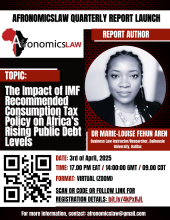Deadline Extension - Call for Applications: Afronomicslaw Masterclass on Climate Finance, the Green Transition, and Sovereign Debt – Accra, Ghana
Join a Transformative Training at the Intersection of Climate Justice, Economic Sovereignty, and Global Governance. Afronomicslaw invites applications for an in-person Masterclass on climate finance and economic justice training taking place in Accra, Ghana. This high level, interdisciplinary program will bring changemakers from across Africa together to unpack the urgent challenges of climate finance, debt, and economic justice facing the continent.

